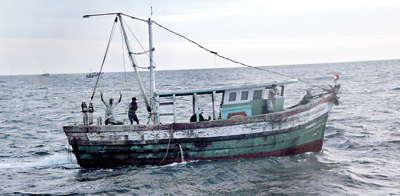News
Tamil Nadu exports fish robbed from Lanka
More than 1,000 Tamil Nadu fishing boats that cross into Sri Lankan waters with impunity thrice a week form part of the southern Indian state’s multi-billion rupee fish export industry catering to the European Union, the United States, Japan and other countries, a Sunday Times investigation has revealed.

Tamil Nadu fishermen put their hands up and perform Hindu rituals of repentance as Sri Lanka Navy boats approach them while poaching in Sri Lankan waters last week. Exclusive picture by Lakshman Gunathilake on board SLN Thilina
The fishermen who cross the International Maritime Boundary Line (IMBL) that separates the two South Asian countries in a flotilla of sophisticated boats are engaged in more than their “livelihood” as made out by the Indian Government and are employed as mere ‘labourers’ for their export industry.
The Tamil Nadu’s state government earned Indian rupees 2,995 crores (at 2004-2005 prices) i.e. about 64 billion Sri Lankan rupees during 2011-2012 by the export of 77,791 metric tonnes of maritime products, to the US, the EU, Japan, China, South East Asia and West Asia.
Much of this catch is from Sri Lankan waters adopting Illegal Unreported Unregulated (IUU) fishing practices, deemed as illegal by the United Nations, the US and other countries’ national laws, while the EU for instance, has slapped a ‘yellow card’ (warning) on Sri Lankan fish exports for being engaged in IUU practices.
IUU practices include the depletion of fish stock, destroying marine habitats, distorting competition and weakening coastal communities, particularly in developing countries. The European Commission official website says that ‘the EU is working hard to close the loopholes that allow illegal operators to profit from their activities”.
![]()
The yield from this poaching by the Indian fishermen, who embark from three major points in Tamil Nadu — Rameshwaran, Nagapatnam and Point Calimere (Tuticorin) –adopting widespread ‘bottom-trawling’ methods in Sri Lankan waters is estimated at 200 kilos a day for a boat. This amounts to 200,000 kilos by the thousand boats. Prawns, shrimp, cuttlefish, sea-crab and reef fish are among their favourite catch, but the nets that scrape the bottom of the sea also result in severe damage to Sri Lanka’s maritime environment.
Amirtham Jesurasa from Rameshwaran, now in remand custody in Sri Lankan for poaching has told Sri Lanka Police in a statement, “There is no more fish in our area. That is the reason we come to Sri Lankan waters. I have come here on previous occasions too and have been taken into custody. It is because of the availability of fish that we come here”.
He adds; “Our boats are owned by businessmen in Tamil Nadu. We only act as labourers. If we return without fish our owner does not pay us. Our families will be starving and (we) have no option, but to engage in illegal fishing”.
Manushandass Aruldas, 42, says, “I am a father of seven children. Some of them do not go to school because I cannot afford to send them. If I do not engage in fishing, I will not be paid by my owner. The boats and nets are owned by businessmen and we are paid on a daily basis”.
India is second only to China in total fish production and the state of Tamil Nadu is ranked fourth in marine fish production in India. Tamil Nadu state Fisheries Minister K.A. Jayapal is on record saying that the state government’s plan is to make Tamil Nadu the “Numero Uno State” in the fishing sector in India.
There are 28 modern seafood processing plants in Tamil Nadu with captive pre-processing, ice production and frozen storage facilities approved for export to EU countries and another nine to non-EU countries, according to Tamil Nadu state government official records.
In their Vision 2023 Prospectus, frozen shrimp is the largest export item from India in the marine sector. “There is considerable potential for output to be increased in Tamil Nadu and shrimp processing is employment intensive,” the prospectus adds. In the 12th Five-Year Plan for Tamil Nadu, the state’s objective is the exploitation of deep sea resources such as tuna and shrimp and to exploit “under-utilised marine fisheries resources”.
While their fishermen, numbering 8.1 million in the southern state of Tamil Nadu with more than 6,000 mechanised boats and nearly 60,000 traditional craft have over-exploited resources in their waters, they have found the Palk Strait rich in catch as it has not been fished in for years during the ‘civil war’ in Sri Lanka’s north. The Tamil Nadu Five-Year Plan also calls for the promotion of eco-friendly coastal aqua-culture while destroying Sri Lanka’s continental shelf.
Sri Lanka’s Navy is under orders by the Government not to “harass” these poaching fishermen adopting IUU practices condemned all over the world due to political and diplomatic pressure from the Indian government. The Sunday Times investigations revealed that the majority of the boats the Indian fishermen come in are fitted with steel hulls — ordinary Indian fishermen’s boats are usually made of wood or fibre glass — and are fitted with expensive GPS, radar, echo-sound (to measure the depth of the water), voice communications and such sophisticated equipment ordinary fishermen cannot afford.
Local fishermen in Sri Lanka’s north complain that they cannot be pitted against these stronger boats that can ram them or cut their nets. “It is an un-even exchange,” said one distraught Sri Lankan Tamil fisherman. “It is fishermen versus fishing businessmen,” he added.

